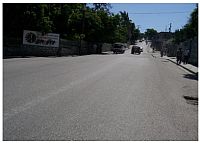From the Open-Publishing Calendar
From the Open-Publishing Newswire
Indybay Feature
HAITI: Pain at the Pump Spurs Strike Actions
PORT-AU-PRINCE, Jun 19 (IPS) - A two-day transport strike last week gripped Haiti's major cities and underscored a mounting crisis over fuel prices, which rose nearly 20 percent in just two weeks.

On Jun. 12 and 13, transport workers shut off their engines, leaving residents of Port-au-Prince and other urban centres largely without the services of taxis or the colourful buses and pick-up trucks known as tap-taps.
A spokesperson for the Initiative de Secteur de Transport, an ad hoc strike committee representing 18 transport unions, Benissoit Duclos, said the action was driven by three pressing issues.
First, the government "has increased traffic fines so that what was a 50-gourde fine is now 1,000 gourdes and what was a 500 gourd fine is now 10,000 gourdes," he said.
"Second, over the last three to four years, the government has not charged for nor distributed registration stickers for vehicles. They are now distributing these but ordering a lump sum payment of 4,000 gourdes for all the years that these were not distributed," Duclos told IPS.
Lastly, the price of gasoline has become unaffordable for most drivers, rising by 34 gourdes to 207 gourdes per gallon this month. Many workers, with a salary that hovers around 70 gourdes a day, must spend 20 to 40 gourdes on transportation (35.4 gourdes equal one U.S. dollar).
The striking workers drive cars and buses, which the working poor depend on for transportation. While some drivers use company cars, many cars are independently owned.
"Poor people, the majority working in the informal economy or assembly industry, cannot afford the higher costs of transportation that these measures would force upon us," said Changeux Méhu, president of ATCH, a union of bus drivers.
"The people don't feel they have a say in government policy," he told IPS.
READ THE ENTIRE STORY
A spokesperson for the Initiative de Secteur de Transport, an ad hoc strike committee representing 18 transport unions, Benissoit Duclos, said the action was driven by three pressing issues.
First, the government "has increased traffic fines so that what was a 50-gourde fine is now 1,000 gourdes and what was a 500 gourd fine is now 10,000 gourdes," he said.
"Second, over the last three to four years, the government has not charged for nor distributed registration stickers for vehicles. They are now distributing these but ordering a lump sum payment of 4,000 gourdes for all the years that these were not distributed," Duclos told IPS.
Lastly, the price of gasoline has become unaffordable for most drivers, rising by 34 gourdes to 207 gourdes per gallon this month. Many workers, with a salary that hovers around 70 gourdes a day, must spend 20 to 40 gourdes on transportation (35.4 gourdes equal one U.S. dollar).
The striking workers drive cars and buses, which the working poor depend on for transportation. While some drivers use company cars, many cars are independently owned.
"Poor people, the majority working in the informal economy or assembly industry, cannot afford the higher costs of transportation that these measures would force upon us," said Changeux Méhu, president of ATCH, a union of bus drivers.
"The people don't feel they have a say in government policy," he told IPS.
READ THE ENTIRE STORY
For more information:
http://ipsnews.net/news.asp?idnews=38228
Add Your Comments
We are 100% volunteer and depend on your participation to sustain our efforts!
Get Involved
If you'd like to help with maintaining or developing the website, contact us.
Publish
Publish your stories and upcoming events on Indybay.
Topics
More
Search Indybay's Archives
Advanced Search
►
▼
IMC Network


